Listen:
Check out all episodes on the My Favorite Mistake main page.
My guest for Episode #306 of the My Favorite Mistake podcast is Betsy Pepine, a serial entrepreneur in real estate and the founder of Pepine Realty. Betsy leads a top-producing real estate team consistently recognized by The Wall Street Journal and has built a family of companies that includes a property management firm, title company, real estate school, and a nonprofit.
She’s also the author of the 2024 book Breaking Boxes: Dismantling the Metaphorical Boxes That Bind Us, which explores the limiting labels and roles we assign ourselves—and how to break free from them.
Betsy’s favorite mistake was starting her brokerage with no clear plan. What began as a solo effort out of her home unexpectedly turned into a team, and eventually a company—but without intentional structure or culture. That all came to a head when her trusted assistant resigned right before a long-overdue family vacation. Her assistant’s honest feedback—about the lack of family, growth, and purpose—was a painful but pivotal wake-up call. Betsy responded not by retreating, but by reading leadership books on her cruise, hiring a coach, and reinventing her company with clear values and a defined mission.
In our conversation, Betsy shares how she rebuilt Pepine Realty around core values like family, impact, and growth. She talks about initiatives like creating a nonprofit to address housing affordability and designing career paths that include a rare salaried-agent model in real estate. We also discuss the power of learning from mistakes—including how her team shares “learnings” each week in a psychologically safe environment that accelerates growth and prevents repeated errors.
Betsy’s story is about far more than real estate—it’s about leadership, self-awareness, and responding to failure with action. Her perspective will resonate with anyone building a team or culture where people feel seen, supported, and inspired to improve.
Questions and Topics:
- What’s your favorite mistake?
- What did your assistant say when she resigned—and how did that become a turning point for you?
- How did you respond to that feedback, and what changes did you make in your business?
- What were the first steps you took to start shaping your company culture?
- Did you create your mission and core values on your own at first?
- How did you define and build a “sense of family” inside your business?
- What inspired you to create a nonprofit—and how does it fit into your overall mission?
- What’s the purpose behind your unique salaried agent role?
- How do you help team members shift roles if they’re not in the right seat?
- What’s the weekly “learnings” segment in your team meeting—and how does it support growth?
- How do you balance encouraging learning from mistakes without being careless?
- Do you use checklists or systems to help prevent mistakes?
- What prompted you to write Breaking Boxes, and what’s the core message of the book?
- How do we recognize when we’re stuck in a metaphorical box—and how do we step out of it?
- What are the main fears that keep people in those boxes?
- Can you share how fear of failure has influenced your thinking over time?
- What does it take to build resilience to change?
- What’s your approach to managing fear of loss—especially status or social connections?
- How did your connection with Barbara Corcoran come about?
- What lessons have you learned from Barbara as a mentor?
- What advice would you give someone thinking of starting a business without a clear plan?
- What do you think are the best reasons for someone to get into real estate?
- How do you view the role of a real estate agent during high-stress life transitions?
- How do you create consistency in values across your family of companies?
- How do you support women reentering society after incarceration—and what’s the deeper “why” behind that work?
Scroll down to find:
- Video version of the episode
- How to subscribe
- Quotes
- Full transcript
Find Betsy on social media:
Video of the Episode:
Quotes:
Click on an image for a larger view
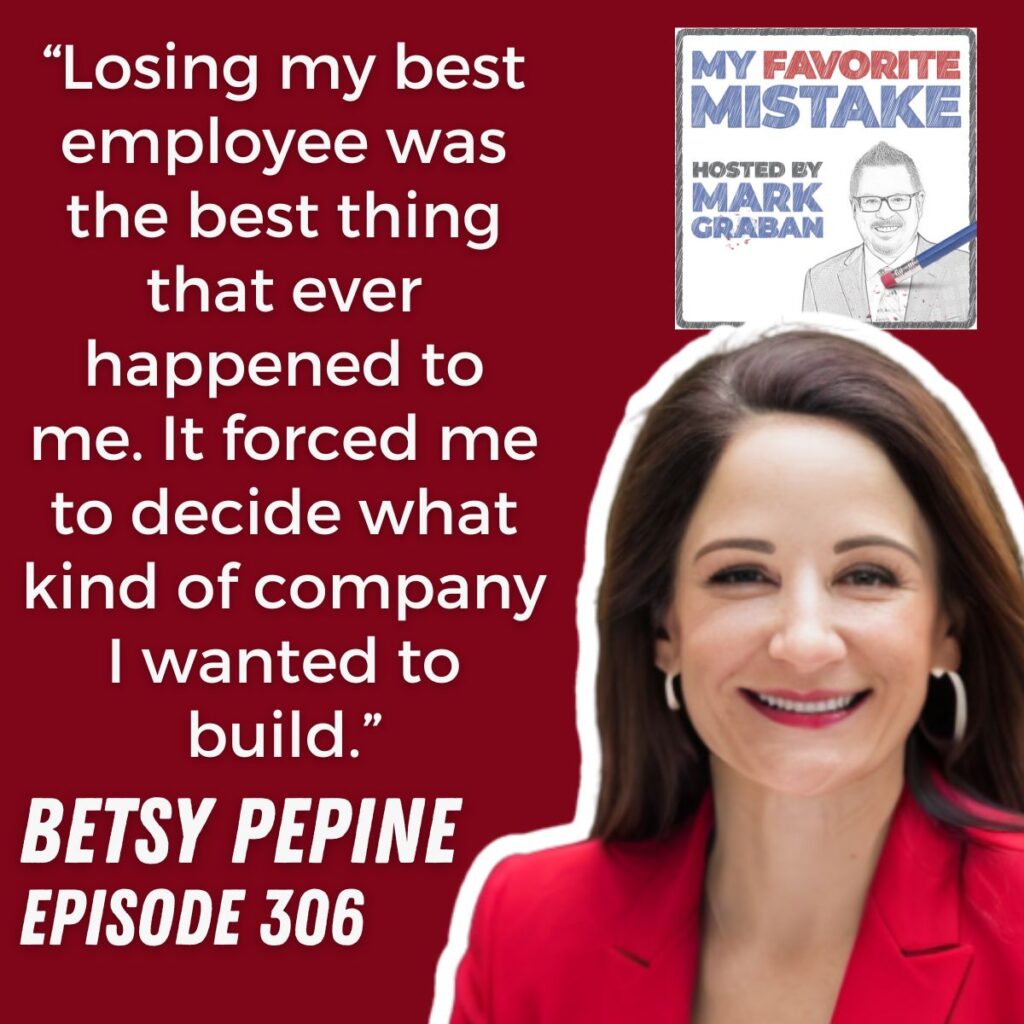
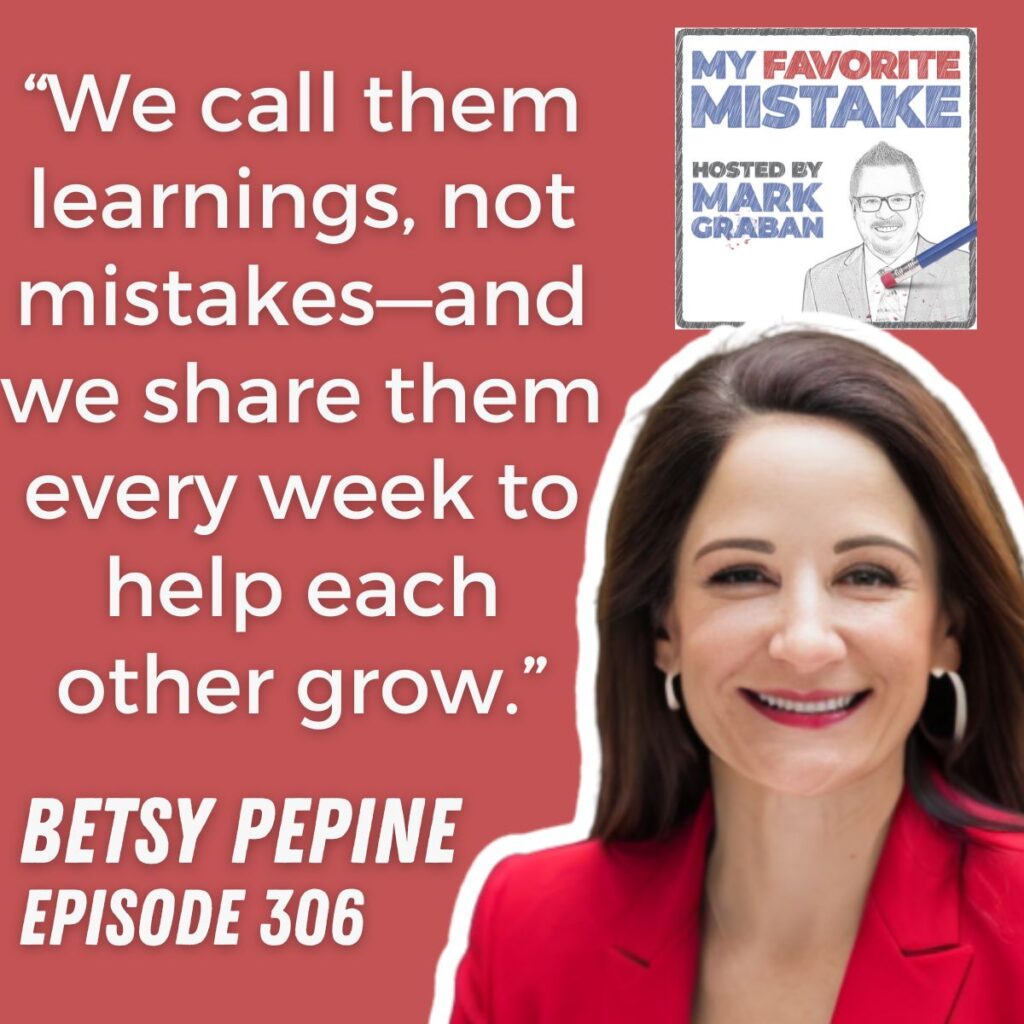
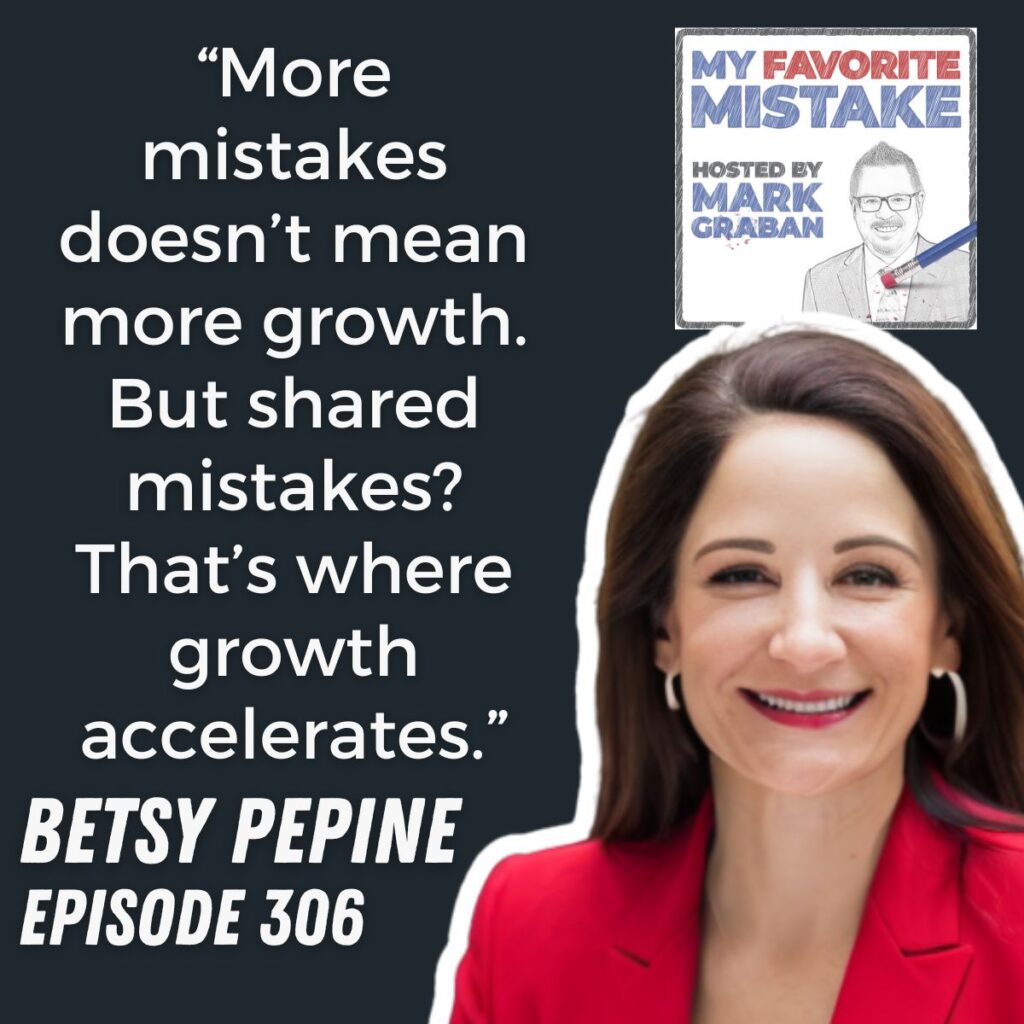
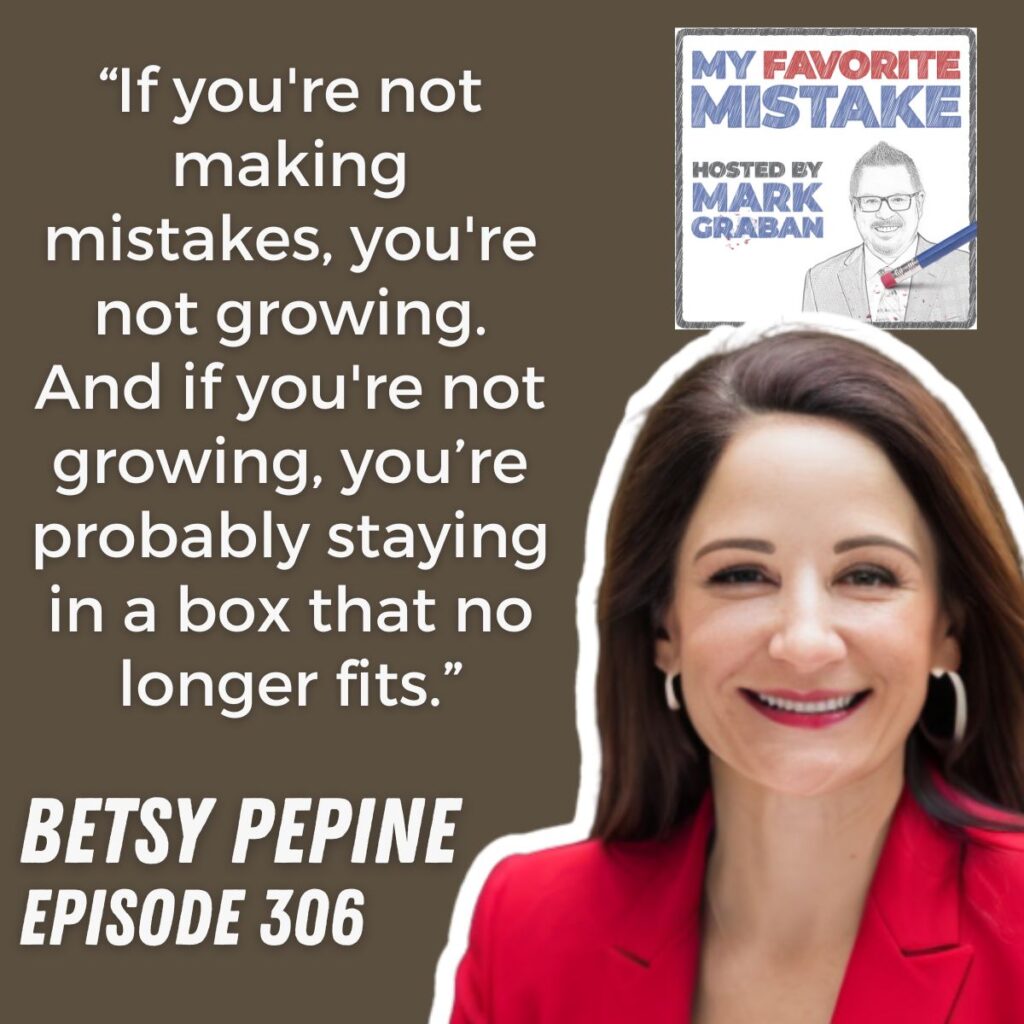
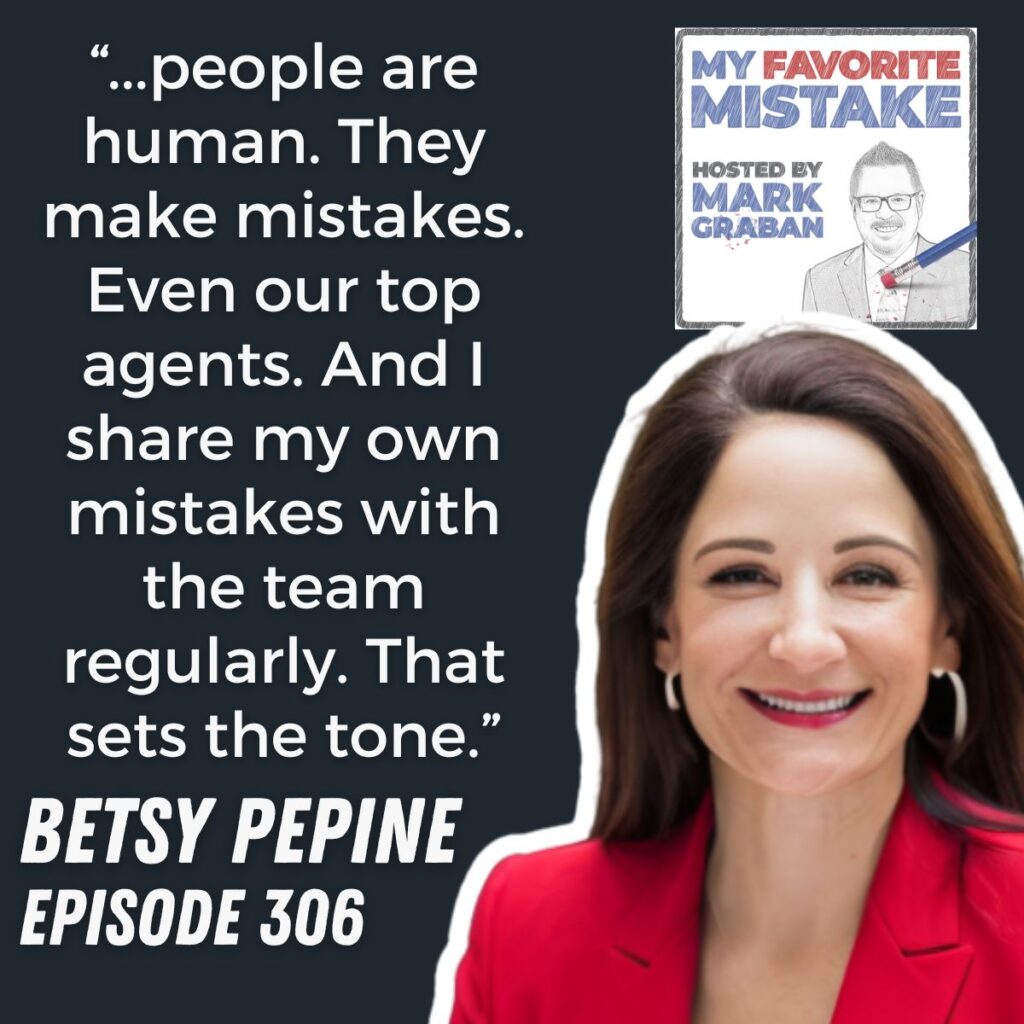
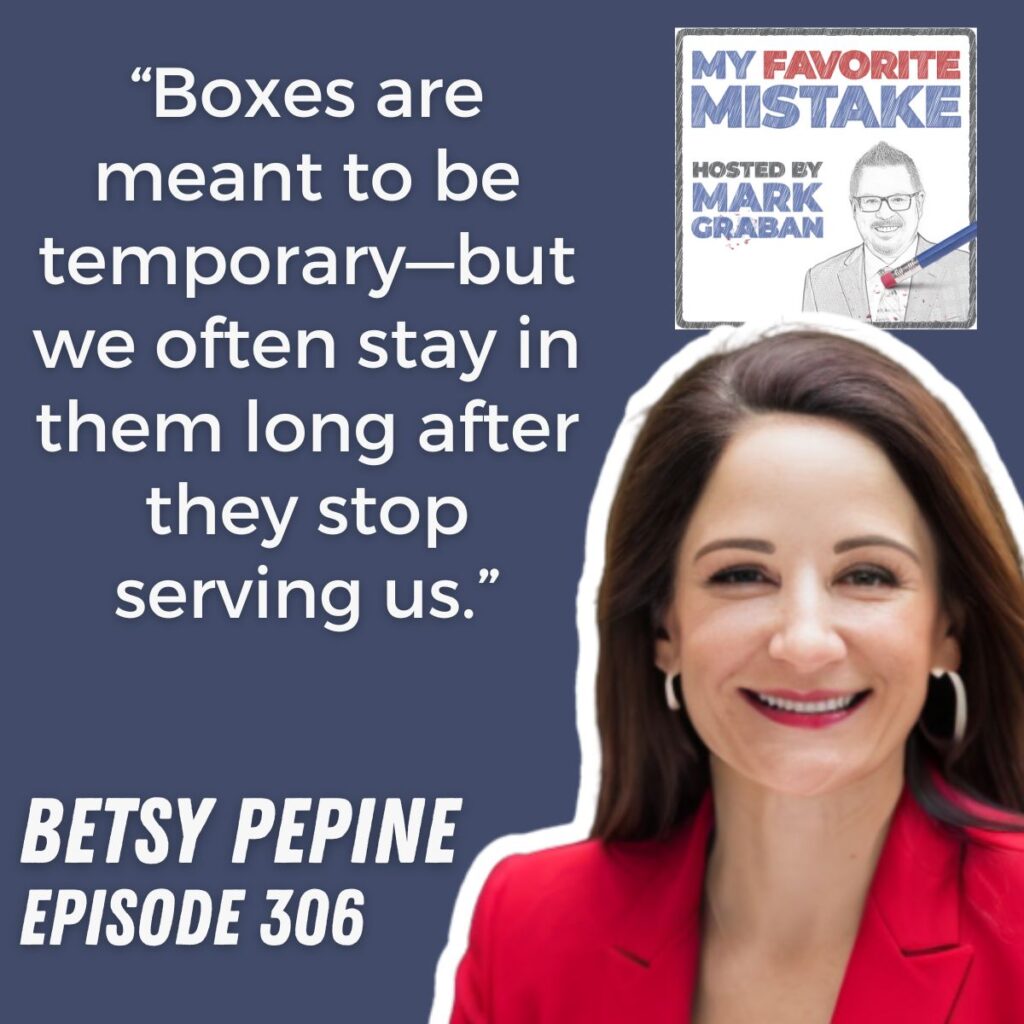
Subscribe, Follow, Support, Rate, and Review!
Please follow, rate, and review via Apple Podcasts, Podchaser, or your favorite app — that helps others find this content, and you'll be sure to get future episodes as they are released weekly. You can also financially support the show through Spotify.
You can now sign up to get new episodes via email, to make sure you don't miss an episode.
This podcast is part of the Lean Communicators network.

Other Ways to Subscribe or Follow — Apps & Email
Episode Summary and More
How One Mistake Sparked a Culture of Growth, Purpose, and Psychological Safety in Real Estate
My guest for Episode #306 of My Favorite Mistake is Betsy Pepine, founder and CEO of Pepine Realty, one of Florida’s top-producing real estate brokerages. A former pharmaceutical industry professional turned serial entrepreneur, Betsy leads a growing family of businesses that includes a property management company, a real estate school, a title agency, and a nonprofit focused on affordable housing. She’s also the author of Breaking Boxes: Dismantling the Metaphorical Boxes That Bind Us, a book that explores how our assumptions and labels can hold us back in life and business.
But before she built this multifaceted, values-driven organization, Betsy made a critical early mistake: she launched her company without a plan.
The Favorite Mistake: Starting a Company with No Plan
Like many entrepreneurs, Betsy started her brokerage firm out of her garage—driven more by a desire for independence than by any structured vision for growth. When other agents asked to join her, she welcomed them, but offered no formal support or company infrastructure. The business grew organically, but haphazardly—until it hit a breaking point.
That moment came just before a long-planned family cruise. Betsy sat down with her assistant—the only other person keeping things running—and was blindsided when the assistant announced she was leaving. The reasons were painfully honest: no sense of family, no path for growth, and no opportunity to give back.
“Losing my best employee was the best thing that ever happened to me. It forced me to decide what kind of company I wanted to build.”
Instead of spiraling, Betsy leaned in. She brought four leadership books with her on that cruise and returned with a mission. The departure wasn't just an HR problem—it was a cultural alarm bell.
Rebuilding on Purpose: Culture, Coaching, and Core Values
Once back on land, Betsy hired a leadership coach and began building Pepine Realty on new foundations. She defined the company’s mission and articulated core values like family, impact, and growth. She didn’t just post those values on a wall—she integrated them into how the company operated.
“We didn’t even have a mission statement. I created one. I created values. And I realized family could be part of how we work—not just something you go home to.”
“Family” became more than a buzzword. At Pepine Realty, team members can bring their kids, pets, or parents to the office. Weekly meetings feel like gatherings, not obligations. Philanthropy was brought into the business, too. Rather than giving back only in her spare time, Betsy created Pepine Gives, a 501(c)(3) nonprofit that raises money to build homes through Habitat for Humanity.
“Boxes are meant to be temporary—but we often stay in them long after they stop serving us.”
Learning from Mistakes—Out Loud
Betsy didn’t just change the business on paper—she changed its rhythm. One of the most impactful new rituals was a weekly meeting segment called “learnings”, where team members voluntarily share mistakes with their peers so everyone can grow.
These aren’t minor errors—they’re high-stakes situations like missing contract clauses or jeopardizing a buyer’s escrow. But they’re shared without shame.
“We call them learnings, not mistakes—and we share them every week to help each other grow.”
The effect? Team members build psychological safety and reduce the likelihood of repeated errors. And in an industry as complex and emotionally charged as real estate—where each transaction represents a life milestone—mistake prevention matters.
“More mistakes doesn’t mean more growth. But shared mistakes? That’s where growth accelerates.”
Innovation from Empathy: Redesigning Roles and Reentry Support
Beyond core values, Betsy brought her problem-solving mindset to operational innovation. One standout example? A salaried real estate agent role—rare in a field dominated by commission-only models. This was designed for high-potential talent who couldn’t financially take the risk of a 1099 income stream, especially early in their careers.
“Some people are on the right bus, but the wrong seat. Now we can help them find the right seat—within the company.”
She also shares her passion for social reintegration. Through her nonprofit work, Betsy supports women reentering society after incarceration by teaching life-building skills—not just job prep. That includes identifying personal pillars of strength, cultivating community, and building resilience to change.
Breaking Boxes—and Building Resilience
Betsy’s book, Breaking Boxes, draws from her life and work to challenge the labels and roles we too often accept as permanent. The metaphor of the box—once useful, now limiting—is one she applies personally and professionally.
“We slap a label on something and stop seeing its complexity. That’s what boxes do.”
Throughout the episode, Betsy shares tactical lessons, raw stories, and a refreshingly grounded leadership style. Her message is clear: mistakes aren’t the enemy of success—they’re part of the path.
“If you're not making mistakes, you're not growing. And if you're not growing, you’re probably staying in a box that no longer fits.”
Automated Transcript (May Contain Mistakes)
Mark Graban:
Hi. Welcome to My Favorite Mistake. I'm your host, Mark Graban. Our guest today is Betsy Pepine. She is a serial entrepreneur in real estate, owning several companies, including a real estate brokerage, a property management firm, and more.
Mark Graban:
She's written her first book. It was published in September 2024. It's titled Breaking Boxes: Dismantling the Metaphorical Boxes That Bind Us. Betsy runs a robust real estate team that The Wall Street Journal has consistently recognized among the top-producing in the United States. She's endorsed by her mentor, the real estate mogul Barbara Corcoran, who you might also know from Shark Tank, with her focus on culture.
Mark Graban:
And we'll talk about that later in the episode. Betsy's brokerage, Pepine Realty, has been named an Inc. 5000 fastest-growing private company in the U.S. multiple times. Betsy has an economics degree from Duke University and an MBA from the Wharton School of Business at the University of Pennsylvania. So, Betsy, thanks for joining us here today.
Betsy Pepine:
Great. So happy to be here, Mark. Thank you for having me.
Mark Graban:
Yeah, so it's great to have you here. I'm looking forward to talking about your book and the culture at your firm. But first things first—the question we always get into here: Of all the different things you've done, what's your favorite mistake?
Betsy Pepine:
I've got so many to choose from. Probably my first big one was when I started my company—my brokerage—and I had no plan. I just knew that I didn’t want to work for somebody else. So I went out on my own and started working.
And over the first maybe two years, slowly, agents in the community asked if they could join me and basically hang their license with me, which was fine.
Betsy Pepine:
But I was very clear: I don't offer anything. You know, I'm working out of my house. I have my broker license. In Florida, you have to work under a broker for at least two years. So I was very transparent up front—that is all I was offering.
Well, before you know it, I had about six to eight agents working in my home. And it was getting rather chaotic.
Betsy Pepine:
And I did have the wherewithal to hire an assistant for us. I hired a woman who had worked with some of us in a previous job. It was great because she knew the industry, she knew us, and things flowed very smoothly for probably the next year and a half. But by that time, I was really getting to a point of burnout.
I hadn’t had a vacation in a long time. I’m a single mom, and my girls and I—I felt like we needed to go away. So I booked a cruise for us.
And two days before the cruise, I sat down with the assistant, because this was the first time I was leaving my company in someone else’s hands. There was a lot I needed to make sure she could handle, especially since this was a time when internet on cruise ships wasn’t great. I was worried—literally leaving my baby with her.
We go to meet, and she's like, “Before you start, Betsy, I need to tell you something.” And I said, “Okay, what is it?” And she said, “I’m leaving.”
Mark Graban:
Oh no.
Betsy Pepine:
Oh my gosh. I was stunned—didn’t see it coming. I said, “Please tell me why.” And fortunately, she was very honest with me. She said there were three reasons:
- “We don’t have a sense of family here.”
- “I don’t see a path for growth in my career.”
- “I don’t see an opportunity to give back to the community.”
And I’m so glad she shared that with me—because she was absolutely right on all three points.
Betsy Pepine:
I had come from a prior industry—pharmaceuticals—where the model was, basically, you sell your time in exchange for a job. That’s how I was treated, and that’s how I understood the world to be. You go home to your family. You go home to give back to the community. Those were things you did outside of work.
So I had put my company in a box. I didn’t realize that, especially for younger people, they want more from their employer. And I had never integrated giving back into my professional life. I did not have a growth path for her—because I had no plan for the company. It was unfair to her.
Betsy Pepine:
It really opened my eyes. I realized: I either need to have a plan or stop pretending I have a company. So instead of packing that night for the cruise, I drove myself to Barnes & Noble. I checked out four books that I believed were the best on culture and leadership.
And I spent the nights on the cruise ship reading—devouring what those leaders did for their companies.
When I came back, I got myself a coach. He heard my story and said, “Betsy, you’ve got to go big or go home.” And I said, “Well, I’m already at home, in my garage. Let’s go big.”
Betsy Pepine:
So the mistake was—well, we don’t really use the word “mistake” in our company—we call them learnings. But that learning was: I didn’t have a plan. I had zero plan when I went out on my own. And I lost a great employee because of it.
Looking back, though, it was the best thing that ever happened to me. It forced me to figure out: What did I want to be when I grow up? What did I want this company to become?
I wish I had done that sooner. When I mentor or coach others now, I always recommend: Get a mentor, get a coach. I think they’re different roles, but both are incredibly helpful. If I had done that five years earlier, I could have accelerated the growth of the company. But I didn’t. So now I’m making up for lost time.
That was the big learning at the beginning.
Mark Graban:
Yeah. Well, I appreciate you sharing that story and your reasoning for why it’s your favorite mistake. That’s a theme here on the podcast: Let’s learn from those mistakes. Let’s make the best of that opportunity.
On a practical note—did you have to postpone the cruise?
What did you do in the short term to keep the company running while you were away? Did the assistant stay on?
Betsy Pepine:
She did stay for two weeks. She was going to one of my biggest competitors, which really caused me some internal turmoil. On one hand, I wanted to let her go immediately—because of the nature of our industry. On the other hand, if I let her go right then, I wouldn’t have been able to take the cruise. And it was really important for my daughters and me to go.
So I let her stay the two weeks. And I did go on the cruise. Fortunately, everything was fine.
I quickly found another assistant, got the coach, developed the mission and core values, and built a real company after that.
Mark Graban:
Yeah, and I’m guessing you had other brokers, other agents, who were looking out for things. So maybe it wasn’t a mistake to let her stay those two weeks. Even if it wasn’t ideal, it sounds like it worked out.
Betsy Pepine:
Right.
Mark Graban:
And it sounded like that cruise was not just a vacation—it was necessary and meaningful. You mentioned you were reaching a point of burnout.
Betsy Pepine:
Right—exactly. My girls and I hadn’t been on a vacation in several years. We needed that time away. So it ended up being perfect.
Mark Graban:
Do you remember what those four books were—the ones you read on the cruise?
Betsy Pepine:
Yes, I do, because someone just asked me that recently.
- EntreLeadership by Dave Ramsey
- The Zappos book (Delivering Happiness)
- The Nordstrom Way
- And one about the Ritz-Carlton—it focused on customer experience, though I don’t remember the exact title.
Mark Graban:
So did the three points your assistant gave—lack of family, lack of growth, no opportunity to give back—become a direct playbook for your culture moving forward?
Betsy Pepine:
Yes.
Mark Graban:
I know you've done a lot around philanthropy. I'd love to hear more about how you addressed each of those areas.
Betsy Pepine:
Sure. First off—we didn’t have a mission statement. We didn’t have core values. So I created them. The first time around, they were just my own life values, honestly.
And “family” was one of them. Family has always been important to me personally, but I had never connected the dots that we could have a sense of family at work too. That was a completely earth-shattering realization to me.
So we made family one of our core values. That means our team is a family, and we also extend that to our clients, their families, even our agents’ pets and kids. Everyone is included. You’ll see kids in our office, dogs in our office, even grandparents. It creates a really warm environment.
Betsy Pepine:
Second, giving back. I’ve always had a service heart, but I had only applied that in my personal life. So I brought it into the company.
That was an easy one to fix—and I loved it. It even freed up my personal time because now I wasn’t the only one doing service work on weekends. It became part of our work life. We made service a core value. A few years later, we updated that core value to impact—because the real reason we do service is to have an impact.
And that shift led us to form a nonprofit, Pepine Gives, which focuses on affordable housing in North Central Florida. We build homes for cost-burdened families in the area. We live in the highest cost-burdened county in Florida. It’s incredibly rewarding for both me and our agents.
Betsy Pepine:
And third—career growth. We now cross-train people. Everyone has a vacation buddy. Even if someone’s out unexpectedly, there’s someone else who knows how to step in. That applies to agents and staff.
We’ve also created career paths across our companies. We have a brokerage, a property management company, a title company, a real estate school, and the nonprofit. If someone isn’t thriving in one area, we can often find them a better role within the organization. They’re on the right bus—maybe just not in the right seat.
Betsy Pepine:
We also created a salaried agent role, which is really rare in real estate. We saw that some people had great potential but couldn’t make the leap from a stable W2 paycheck to a 1099 commission-based income—especially in those first two years.
So now, someone can come on board as a salaried agent, gain experience, build confidence, and later, if they choose, move to a team agent or independent agent model. It creates a much more accessible entry point.
Mark Graban:
Wow. That sounds like good problem-solving. My engineering brain hears, “There was a challenge, and you built a system to address it.” Instead of just saying, “Well, that’s how it is,” you created something new.
How rare is it to have salaried agents in your industry?
Betsy Pepine:
Very, very uncommon. Almost unheard of.
Mark Graban:
Yeah. I love that. You saw a gap and filled it.
Betsy Pepine:
Exactly. I do make a lot of mistakes—but I think I’m really good at learning from them. And I truly believe the more mistakes you make, the faster you grow—because that’s how you learn. I do not learn when I’m static and comfortable.
So unless I’m trying new things and learning from them, I don’t feel like I’m growing.
Mark Graban:
Yeah. So where is the company now, in terms of team size? I’m guessing you grew out of the garage pretty quickly.
Betsy Pepine:
We did. Right now we have about 50 people. Before COVID, we were closer to 75. It fluctuates with the market.
Some people get into real estate when the market is hot—but that’s not a great reason to enter the field. Our sweet spot is probably 75. When we were at that size, I started to not know people’s names, and that really bothered me.
Mark Graban:
So, in your view, what’s the right reason to get into real estate?
Betsy Pepine:
Great question. Honestly, nurses, teachers, and law enforcement professionals tend to make the best real estate agents. Why? Because they truly have a heart for service. They're in it for the right reasons.
You don’t need to love houses. In fact, I tell people, if you're getting into real estate because you love houses—don’t. You’ll become disillusioned quickly. The houses you see online or on TV aren’t what real life looks like. You’re seeing 50–60 houses a week—it gets old fast.
You should be getting into real estate because you like helping people. Because you’re a problem solver. And because you understand that buying a house is a life event.
Betsy Pepine:
To me, a life event is something you’ll still remember in five years. Ask anyone what homes they’ve owned—they’ll list every one of them. Then ask them why they bought a house. Almost always, it’s tied to another life event:
- A new job
- A job loss
- A marriage
- A divorce
- A new child
- A death
- A promotion
There are four life events involved in every real estate transaction: two on the seller side, two on the buyer side. That creates a ton of stress.
So, our job as agents is to reduce that stress. It’s really a customer service job. Our goal is to make the process as smooth and human-centered as possible.
Mark Graban:
Beautifully said. Now, shifting back to culture: You’ve started multiple companies under the Pepine umbrella. Are the values and culture consistent across them?
Betsy Pepine:
Yes. They’re all under one roof, and we hold one large company-wide meeting every Tuesday. We treat it as one company—one family. The mission statements might differ slightly, but the core values are shared.
We use similar branding—logos, colors, external marketing—so there’s a sense of cohesion across all the entities.
Mark Graban:
Earlier, you mentioned being really intentional about learning from mistakes. I’d love to hear about the weekly “learnings” you mentioned in your team meetings.
Betsy Pepine:
Yes! Every Tuesday, during our company-wide meeting, we have a segment called “learnings.” It's truly my favorite part of the meeting—and I think it's become a favorite for a lot of our agents too.
This is where people share what other companies might call mistakes—and they share them with the entire team. And these aren’t small things.
Betsy Pepine:
For example, a new agent might share that they accidentally jeopardized a buyer’s escrow—thousands of dollars—because they missed something in the contract. Or maybe they forgot to include a washer and dryer in the deal and had to buy them out-of-pocket.
In most settings, people would be mortified to admit these things. But we bring them out in the open—because we want everyone to learn from it. We say: “You’ll still make mistakes. But maybe not this one, because someone else just saved you from it.”
It really speeds up everyone's learning curve. And it reduces the total number of mistakes made across the organization.
Betsy Pepine:
It’s actually become a little bit of a friendly competition—who can bring in the best “learning” of the week. We normalize it. And I think it's one of the reasons our team grows so quickly.
You just can’t get that kind of shared wisdom as a solo agent working by yourself.
Mark Graban:
That reminds me of something Jim McCann, the founder of 1-800-Flowers, said when he was on the podcast. He shared a similar practice—making customer service mistakes a learning opportunity, even keeping it light when possible.
Of course, in real estate—or flower delivery—these are often tied to big life events. A mistake can really upset someone. But when you create a safe, blame-free culture, people are less likely to hide things. That leads to fewer overall mistakes.
Betsy Pepine:
Exactly. It’s not about being flippant. We’re not encouraging carelessness. In fact, we do have systems in place—like a “three strikes” rule—if someone’s being truly careless.
But we also have to remember: people are human. They make mistakes. Even our top agents. And I share my own mistakes with the team regularly. That sets the tone.
Betsy Pepine:
Just like physical boxes, metaphorical boxes can protect us—for a while. But most of them are meant to be temporary. The problem is we stay in them too long.
I know I’ve overstayed my welcome in boxes that no longer served me. Whether it was expectations from my family, my industry, or society—I stayed in those boxes out of habit, or fear, or comfort.
The book explores different types of boxes:
- Boxes other people put us in
- Boxes we put ourselves in
- Boxes that come from gender roles, job titles, societal norms
And the first step to breaking out is awareness—realizing you’re in a box.
Mark Graban:
So you’d say the first step is just recognizing, “Oh, I’m in a box,” and realizing there’s something outside of it?
Betsy Pepine:
Exactly. Once you have that awareness, you ask yourself: Why am I still in this box?
And usually, if we’re honest, it comes down to fear—fear of failure, fear of change, or fear of loss.
I write everything down. I’m a visual learner, and when things stay in my head, they feel bigger than they are. When I get them on paper, it’s like, Oh… okay. That’s not so bad.
Betsy Pepine:
Take fear of failure, for example. That’s a box I threw out a long time ago. Failure is a human judgment. I’ve got two dogs lying next to me—they’re not worried about failing to catch the cat today.
What I might call a failure might be someone else’s dream opportunity. And worst case? I try something, it doesn’t work, and I pivot. But I learned something valuable along the way.
I can live with that.
Mark Graban:
That’s a healthy mindset. What about the fear of change?
Betsy Pepine:
To me, that’s a muscle. You get better at dealing with change by facing it regularly. One small example: every morning, I take an ice-cold shower. That might be the only uncomfortable thing I do all day—but it trains me to lean into discomfort and builds resilience.
Betsy Pepine:
The last big fear is fear of loss. And that usually shows up in three ways:
- Loss of status
- Loss of social connection
- Loss of financial security
Betsy Pepine:
Fear of status? That’s ego. And I try to remind myself: just shelve the ego. Don’t let it make your decisions for you.
Fear of social connection is more real. When you make a major move—professionally or personally—some people will drift away. And that’s okay. Some relationships serve a season or a chapter. The dynamic is complete.
So what I do is shore up where I’m going. I make sure I’ve got mentors, peer groups, and support in the new phase of life I’m moving into. That makes the transition less scary.
Betsy Pepine:
And then financial loss? That’s a big one—especially in real estate. People may want to make a career move, but they can’t risk inconsistent income. That’s why we created the salaried agent position. It’s a bridge.
Plus, with the gig economy and online opportunities, people today have more flexibility to create income while they make career transitions. That wasn’t available when I got started.
Mark Graban:
You’ve mentioned mentors a few times. One of them is Barbara Corcoran. How did that relationship come about?
Betsy Pepine:
It was actually kind of serendipitous. I was buying TV and radio media through an agency in New York, and the man I worked with there knew Barbara. He asked me, “Would you like her to mentor you?”
Absolutely!
Barbara is amazing. Her first career was in real estate. She built her brokerage twice. She’s a single mom, like I was. We had so many parallels. She’s 76 now and still going strong.
Mark Graban:
That’s incredible. So this episode connects to someone who’s been on Shark Tank since the beginning.
The very first episode of this podcast featured Kevin Harrington, who was also on the first season of Shark Tank. He’s credited with inventing the 30-minute infomercial. Very different background than Barbara, but interesting to see these connections over time.
Mark Graban:
From the very first episode of this podcast to now, I love seeing the patterns. So many successful entrepreneurs, like yourself, emphasize learning from failure and bouncing back. It's reassuring to hear that again and again.
Betsy Pepine:
Yeah—you can't succeed without failing. It's not possible. I think the most successful people are the ones who’ve failed the most—but also learned the most and bounced back the quickest.
Mark Graban:
Well said. I know we’ve talked about culture, coaching, and growth. Before we wrap, can you tell us more about your philanthropic work—especially your nonprofit, Pepine Gives?
Betsy Pepine:
Absolutely. Pepine Gives is our 501(c)(3). We raise money in a variety of ways—grants, online donations, and through events. We host a huge golf tournament every year, a big pickleball tournament—it’s fun and community-focused.
We also partner with Habitat for Humanity and help build homes. And I love that Habitat is a hand up, not a handout. People pay appraised value for their homes, and they take educational classes on home maintenance and financial literacy. It's all designed to set them up for success—not just hand them keys and walk away.
We’re expanding now to include repair and accessibility projects for families who are already in homes but need support—especially post-hurricane or for ADA needs.
Mark Graban:
That’s fantastic. And I know one other issue you care about is helping formerly incarcerated women reintegrate. Can you share more about that?
Betsy Pepine:
Yes. That’s been a passion of mine for a long time. Honestly, I joke that maybe in a past life I was incarcerated, because I’ve always felt a strong pull toward this population.
I started by teaching financial literacy classes, using Dave Ramsey’s Financial Peace curriculum. But I quickly realized—these women had no money to manage. They leave prison with almost nothing, often no family support, no transportation, and no job prospects. In a city like ours, with limited public transit, no car means no job.
So I pivoted. I started helping them build life skills instead—what I call “life pillars.” We talk about building a foundation across health, finances, relationships, spirituality, hobbies, and service. Because if one or two of your life legs go out, you need others to keep you standing.
Mark Graban:
That’s such a valuable framework—and really inspiring. Betsy, thank you for all the work you do, and for sharing so openly here today. This conversation has been full of insights and practical advice.
Again, our guest has been Betsy Pepine. Her book is Breaking Boxes: Dismantling the Metaphorical Boxes That Bind Us. You can learn more at betsypepine.com.
Betsy Pepine:
Thank you, Mark. It’s been a pleasure.

